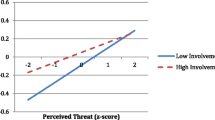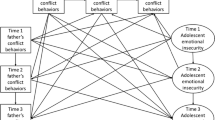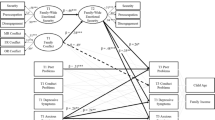Abstract
Researchers have begun to develop models that explain the processes by which interparental conflict impacts children's adjustment. The present study tested a model based on emotional security theory. The longitudinal relations among interparental conflict, boys' reactions to conflict, and internalizing and externalizing problems were examined in a sample of 129 mother–son dyads from low-income, 2-parent families from the time sons were age 2 to 5. Results indicated that children exposed to interparental conflict were more likely to have concurrent and later behavior problems and that patterns of interparental conflict across time made unique contributions in predicting later problems. Children's emotional reactivity in response to conflict had no direct relation to interparental conflict and only modest relations to behavior problems. However, interparental conflict and reactivity factors interacted to predict behavior problems at ages 3 1/2 and 5. Thus, some support was demonstrated for emotional reactivity as a moderator in the development of young children's behavior problems.
Similar content being viewed by others
REFERENCES
Achenbach, T. M. (1991). Manual for the Child Behavior Checklist and 1991 Profile. Burlington, VT: University of Vermont.
Achenbach, T. M. (1992). Manual for the Child Behavior Checklist and Revised Child Behavior Profile. Burlington, VT: University of Vermont.
Achenbach, T. M., McConaughy, S. H., & Howell, C. T. (1987). Child-adolescent behavioral and emotional problems: Implications of cross-informant correlations for situational specificity. Psychological Bulletin, 101, 213–232.
Aiken, L. S., & West, S. G. (1991). Multiple regression: Testing and interpreting interactions. Newbury Park, CA: Sage.
Bakeman, R., & Gottman, J. M. (1987). Applying observational methods: A systematic view. In J. D. Osofsky (Ed.), Handbook of infant development (2nd ed., pp. 818–854). New York: Wiley.
Baron, R. M., & Kenny, D. A. (1986). The moderator-mediator variable distinction in social psychological research: Conceptual, strategic, and statistical considerations. Journal of Personality and Social Psychology, 6, 1173–1182.
Belsky, J. (1984). The determinants of parenting: A process model. Child Development, 55, 83–96.
Brooks-Gunn, J., & Furstenberg, F. F. (1987). Continuity and change in the context of poverty: Adolescent mothers and their children. In J. J. Gallagher & C. T. Ramey (Eds.), The malleability of children. Baltimore: Brookes.
Chess, S., Thomas, A., Mittelman, M., Korn, S., & Cohen, J. (1983). Early parental attitudes, divorce and separation, and young adult outcome: Findings of a longitudinal study. Journal of the American Academy of Child Psychiatry, 22, 47–51.
Crockenberg, S., & Forgays, D. K. (1996). The role of emotion in children's understanding and emotional reactions to marital conflict. Merrill-Palmer Quarterly, 42, 22–47.
Cummings, E. M., Ballard, M., & El-Sheikh, M. (1991). Responses of children and adolescents to interadult anger as a function of gender, age, and mode of expression. Merrill-Palmer Quarterly, 37, 543–560.
Cummings, E. M., & Davies, P. T. (1998). Exploring children's emotional security as a mediator of the link between marital relations and child adjustment. Child Development, 69, 124–139.
Cummings, E. M., Davies, P. T., & Simpson, K. S. (1994). Marital conflict, gender, and children's appraisals and coping efficacy as mediators of child adjustment. Journal of Family Psychology, 8, 141–149.
Cummings, E. M., Hennessy, K. D., Rabideau, G. J., & Cicchetti, D. (1994). Responses of physically abused boys to interadult anger involving their mothers. Development and Psychopathology, 6,31–41.
Cummings, E. M., lanotti, R. J., & Zahn-Waxler, C. (1985). Influence of conflict between adults on the emotions and aggression of young children. Developmental Psychology, 21, 495–507.
Cummings, E. M., Vogel, D., Cummings, J. S., & El-heikh, M. (1989). Children's responses to different forms of expression of anger between adults. Child Development, 60, 1392–1404.
Cummings, E. M., Zahn-Waxler, C., & Radke-Yarrow, M. (1981). Young children's responses to expressions of anger and affection by others in the family. Child Development, 52, 1274–1282.
Cummings, J. S., Pelligrini, D. S., Notarius, C. I., & Cummings, E. M. (1989). Children's responses to angry adult behavior as a function of marital distress and history of interparent hostility. Child Development, 60, 1035–1043.
Davies, P. T., & Cummings, E. M. (1994). Marital conflict and child adjustment: An emotional security hypothesis. Psychological Bulletin, 116, 387–411.
Dodge, K. A. (1986). A social information processing model of social competence in children. In M. Perlmutter (Ed.), Eighteenth Annual Minnesota Symposium of Child Psychology (pp. 77–125). Hillsdale, NJ: Erlbaum.
El-Sheikh, M., & Cummings, E. M. (1992). Perceived control and preschoolers' responses to interadult anger. International Journal of Behavioral Development, 15, 207–226.
Emery, R. E. (1988). Marriage, divorce, and children's adjustmen. Newbury Park, CA: Sage.
Emery, R. E., & O'Leary, K. D. (1984). Marital discord and child behavior problems in a nonclinic sample. Journal of Abnormal Child Psychology, 10, 215–228.
Erickson, M. F., Sroufe, L. A., & Egeland, B. (1985). The relationship between quality of attachment and behavior problems in a high-risk sample. In I. Bretherington & E. Waters (Eds.), Growing points of attachment theory and research. Monographs of the society for research in child development (Vol. 50, pp. 147–167).
Fantuzzo, J. W., DePaola, L. M, Lambert, L., Martino, T, Anderson, G., & Sutton, S. (1991). Effects of interparental violence on the psychological adjustment and competencies of young children. Journal of Consulting and Clinical Psychology, 39, 258–265.
Fauber, R., Forehand, R., Thomas, A., & Wierson, M. (1990). A mediational model of the impact of marital conflict on adolescent adjustment in intact and divorced families: The role of disrupted parenting. Child Development, 61, 1112–1123.
Fincham, F. D. (1994). Understanding the association between marital conflict and child adjustment: Overview. Journal of Family Psychology, 8, 123–127.
Fincham, F. D., Grych, J. H., Osborne, L. N. (1994). Does marital conflict cause child maladjustment? Directions and challenges for longitudinal research. Journal of Family Psychology, 8, 128–140.
Furstenberg, F. F. (1993). How families manage risk and opportunity in dangerous neighborhoods. In W. J. Wilson (Ed.), Sociology and the public agenda (pp. 231–258). Newbury Park, CA: Sage.
Grych, J. H., & Fincham, F. D. (1990). Marital conflict and children's adjustment: A cognitive-contextual framework. Psychological Bulletin, 108, 267–290.
Grych, J. H., & Fincham, F. D. (1995). Children's appraisals of marital conflict: Initial investigations of the cognitive-contextual framework. Child Development, 64, 215–230.
Hennessy, K. D., Rabideau, G. R., Cicchetti, D., & Cummings, E. M. (1994). Responses of physically abused and nonabused children to different forms of interadult anger. Child Development, 65, 815–828.
Hetherington, E. M., Cox, M., & Cox, R. (1982). Effects of divorce on parents and children. In M. E. Lamb (Ed.), Non-traditional families: Parenting and child development (pp. 233–288). Hillsdale, NJ: Erlbaum.
Hollingshead, A. B. (1975). Four-factor index of social status. Unpublished manuscript, Yale University, New Haven, CT.
Jenkins, J. M., & Smith, M. A. (1991). Marital disharmony and children's behavior problems: Aspects of a poor marriage that affect children adversely. Journal of Child Psychology and Psychiatry, 32, 793–810.
Jenkins, J. M., Smith, M. A., & Graham, P. J. (1989). Coping with parental quarrels. Journal of the American Academy of Child and Adolescent Psychiatry, 28, 182–189.
Johnston, J. R., Gonzalez, R., & Campbell, L. E. G. (1987). Ongoing postdivorce conflict and chid disturbance. Journal of Abnormal Child Psychology, 15, 493–509.
Jouriles, E. N., Murphy, C. M., Farris, A. N., Smith, D. A., Richters, J. E., & Waters, E. (1991). Marital adjustment, parental disagreements about child rearing, and behavior problems in boys: Increasing the specificity of the marital assessment. Child Development, 62, 1424–1433.
Jouriles, E. N., Murphy, C. M., & O'Leary, K. D. (1989). Interspousal aggression, marital discord, and child problems. Journal of Consulting and Clinical Psychology, 57, 433–455.
Jouriles, E. N., Pfiffner, L. J., & O'Leary, S. J. (1988). Marital conflict, parenting, and toddler conduct problems. Journal of Abnormal Child Psychology, 16, 197–206.
Katz, L. F., & Gottman, J. M. (1995). Marital interaction and child outcomes: A longitudinal study of mediating and moderating processes. In D. Cichetti & S. L. Toth (Eds.), Rochester Symposium on Developmental Psychopathology: Emotion, cognition, and representation (pp. 301–342). Rochester, NY: University of Rochester Press.
Long, N., Slater, E., Forehand, R., & Fauber, R. (1988). Continued high or reduced interparental conflict following divorce: Relation to young adolescent adjustment. Journal of Consulting and Clinical Psychology, 56, 467–469.
McLoyd, V. (1990). The impact of economic hardship on black families and children: Psychological distress, parenting, and socioemotional development. Child Development, 61, 11–346.
O'Brien, M., Margolin, G., & John, R. S. (1995). Relation among marital conflict, child coping, and child adjustment. Journal of Clinical Child Psychology, 24, 346–361.
O'Brien, M., Margolin, G., John, R. S., & Krueger, L. (1991). Mothers' and sons' cognitive and emotional reactions to simulated marital and family conflict. Journal of Consulting and Clinical Psychology, 59, 692–703.
Patterson, G. R., DeBaryshe, B. D., & Ramsey, E. (1989). Developmental perspective on antisocial behavior. American Psychologist, 44, 329–335.
Porter, B., & O'Leary, K. D. (1980). Marital discord and childhood behavior problems. Journal of Abnormal Child Psychology, 8, 287–295.
Raine, A. (1993). The psychopathology of crime: Criminal behavior as a clinical disorder. San Diego, CA: Academic Press.
Rossman, B. B., & Rosenberg, M. S. (1992). Family stress and functioning in children: The moderating effects of children's beliefs about their control over parental conflict. Journal of Child Psychology and Psychiatry, 33, 699–715.
Sameroff, A. (1983). Developmental systems: Context and evolution. In W. Kessen (Ed.), & P. H. Mussen (Series Ed.), Handbook of child psychology: Volume 1. History, theory, and methology (pp. 238–294). New York: Wiley.
Shaw, D. S., & Vondra, J. I. (1993). Chronic family adversity and infant attachment security. Journal of Child Psychology and Psychiatry, 34, 1205–1215.
Shaw, D. S., Winslow, E. B., Owens, E. B., & Hood, N. (1998). Young children's adjustment to chronic family adversity: A longitudinal study of low-income families. Journal of the American Academy of Child and Adolescent Psychiatry, 37, 545–553.
Shaw, D. S., Winslow, E. B., Owens, E. B., Vondra, J. 1., Conn, J. F,, & Bell, R. Q. (1998). The development of early externalizing problems among children from low-income families: A transformational perspective. Journal of Abnormal Child Psychology, 26, 95–107.
Strassberg, Z., Dodge, K. A., Bates, J. E., & Pettit, G. S. (1992). The longitudinal relation between parent conflict strategies and children's sociometric standing in kindergarten. Merrill-Palmer Quarterly, 38, 477–493.
Straus, M. A. (1979). Measuring intrafamily conflict and violence: The conflict tactics scales. Journal of Marriage and the Family, 41, 75–88.
Straus, M. A. (1991). Family violence in American families: Incidence rates, causes, and trends. In D. D. Knudsen & J. L. Miller (Eds.), Abused and battered: Social and legal responses of family violence (pp. 17–34). New York: Aldine de Gruyter.
U. S. Bureau of the Census. (1992). Current population reports, Series P-60, No. 181. Poverty in the UnitedStates: 1991. Washington, DC: U.S. Government Printing Office.
Zillman, D. (1983). Arousal and aggression. In R. G. Geen & E. I. Donnetslein (Eds.), Aggression: Theoretical and empirical reviews: Volume 1. Theoretical and methodological issues (pp. 75–101). San Diego, CA: Academic Press.
Author information
Authors and Affiliations
Rights and permissions
About this article
Cite this article
Ingoldsby, E.M., Shaw, D.S., Owens, E.B. et al. A Longitudinal Study of Interparental Conflict, Emotional and Behavioral Reactivity, and Preschoolers' Adjustment Problems among Low-Income Families. J Abnorm Child Psychol 27, 343–356 (1999). https://doi.org/10.1023/A:1021971700656
Issue Date:
DOI: https://doi.org/10.1023/A:1021971700656




